Aloud she said, “And how is Mrs. Pentland. … I mean Olivia … not my cousin. … I know how she is … no better.”
“No better. … It is one of those things which I can never understand. … Why God should have sent such a calamity to a good man like my brother.”
“But Olivia…” began Sabine, putting an end abruptly to what was clearly the prelude to a pious monologue.
“Oh! … Olivia,” replied Aunt Cassie, launching into an account of the young Mrs. Pentland. “Olivia is an angel … an angel, a blessing of God sent to my poor brother. But she’s not been well lately. She’s been rather sharp with me … even with poor Miss Peavey, who is so sensitive. I can’t imagine what has come over her.”
It seemed that the strong, handsome Olivia was suffering from nerves. She was, Aunt Cassie said, unhappy about something, although she could not see why Olivia shouldn’t be happy … a woman with everything in the world.
“Everything?” echoed Sabine. “Has anyone in the world got everything?”
“It is Olivia’s fault if she hasn’t everything. All the materials are there. She has a good husband … a husband who never looks at other women.”
“Nor at his own wife either,” interrupted Sabine. “I know all about Anson. I grew up with him.”
Aunt Cassie saw fit to ignore this. “She’s rich,” she said, resuming the catalogue of Olivia’s blessings.
And again Sabine interrupted, “But what does money mean, Aunt Cassie? In our world one is rich and that’s the end of it. One takes it for granted. When one isn’t rich any longer, one simply slips out of it. It has very little to do with happiness.”
The strain was beginning to show on Aunt Cassie. “You’d find out if you weren’t rich,” she observed with asperity, “if your father and great-grandfather hadn’t taken care of their money.” She recovered herself and made a deprecating gesture. “But don’t think I’m criticizing dear Olivia. She is the best, the most wonderful woman.” She began to wrap herself once more in kindliness and charity and forgiveness. “Only she seems to me to be a little queer lately.”
Sabine’s artificially crimson mouth took on a slow smile. “It would be too bad if the Pentland family drove two wives insane—one after the other.”
Again Aunt Cassie came near to defeat by losing her composure. She snorted, and Sabine helped her out by asking: “And Anson?” ironically. “What is dear Anson doing?”
She told her of Anson’s great work, “The Pentland Family and the Massachusetts Bay Colony” and of its immense value as a contribution to the history of the nation; and when she had finished with that, she turned to Jack’s wretched health, saying in a low, melancholy voice, “It’s only a matter of time, you know. … At least, so the doctors say. … With a heart like that it’s only a matter of time.” The tears came again.
“And yet,” Sabine said slowly, “you say that Olivia has everything.”
“Well,” replied Aunt Cassie, “perhaps not everything.”
Before she left she inquired for Sabine’s daughter and was told that she had gone over to Pentlands to see Sybil.
“They went to the same school in France,” said Sabine. “They were friends there.”
“Yes,” said Aunt Cassie. “I was against Sybil’s going abroad to school. It fills a girl’s head with queer ideas … especially a school like that where anyone could go. Since she’s home, Sybil behaves very queerly. … I think it’ll stand in the way of her success in Boston. The boys don’t like girls who are different.”
“Perhaps,” said Sabine, “she may marry outside of Boston. Men aren’t the same everywhere. Even in Boston there must be one or two who don’t refer to women as ‘Good old So-and-so! Even in Boston there must be men who like women who are well dressed … women who are ladies. …”
Aunt Cassie began to grow angry again, but Sabine swept over her. “Don’t be insulted, Aunt Cassie. I only mean ladies in the old-fashioned, glamorous sense. … Besides,” she continued, “whom could she marry who wouldn’t be a cousin or a connection of some sort?”
“She ought to marry here… among the people she’s always known. There’s a Mannering boy who would be a good match, and James Thorne’s youngest son.”
Sabine smiled. “So you have plans for her already. You’ve settled it?”
“Of course, nothing is settled. I’m only thinking of it with Sybil’s welfare. If she married one of those boys she’d know what she was getting. She’d know that she was marrying a gentleman.”
“Perhaps …” said Sabine. “Perhaps.” Somehow a devil had taken possession of her and she added softly, “There was, of course, Horace Pentland. … One can never be quite sure.” (She never forgot anything, Sabine.)
And at the same moment she saw, standing outside the door that opened on the terrace next to the marshes, a solid, dark, heavy figure which she recognized with a sudden feeling of delight as O’Hara. He had been walking across the fields with the wiry little Higgins, who had left him and continued on his way down the lane in the direction of Pentlands. At the sight of him, Aunt Cassie made every sign of an attempt to escape quickly, but Sabine said in a voice ominous with sweetness, “You must meet Mr. O’Hara. I think you’ve never met him. He’s a charming man.” And she placed herself in such a position that it was impossible for the old woman to escape without losing every vestige of dignity.
Then Sabine called gently, “Come in, Mr. O’Hara. … Mrs. Struthers is here and wants so much to meet her new neighbor.”
The door opened and O’Hara stepped in, a swarthy, rather solidly built man of perhaps thirty-five, with a shapely head on which the vigorous black hair was cropped close, and with blue eyes that betrayed his Irish origin by the half-hidden sparkle of amusement at this move of Sabine’s. He had a strong jaw and full, rather sensual, lips and a curious sense of great physical strength, as if all his clothes were with difficulty modeled to the muscles that lay underneath. He wore no hat, and his skin was a dark tan, touched at the cheekbones by the dull flush of health and good blood.
He was, one would have said at first sight, a common, vulgar man in that narrow-jawed world about Durham, a man, perhaps, who had come by his muscles as a dock laborer. Sabine had thought him vulgar in the beginning, only to succumb in the end to a crude sort of power which placed him above the realm of such distinctions. And she was a shrewd woman, too, devoted passionately to the business of getting at the essence of people; she knew that vulgarity had nothing to do with a man who had eyes so shrewd and full of mockery.
He came forward quietly and with a charming air of deference in which there was a faint suspicion of nonsense, a curious shadow of vulgarity, only one could not be certain whether he was not being vulgar by deliberation.
“It is a great pleasure,” he said. “Of course, I have seen Mrs. Struthers many times … at the horse shows … the whippet races.”
Aunt Cassie was drawn up, stiff as a poker, with an air of having found herself unexpectedly face to face with a rattlesnake.
“I have had the same experience,” she said. “And of course I’ve seen all the improvements you have made here on the farm.” The word “improvements” she spoke with a sort of venom in it, as if it had been instead a word like “arson.”
“We’ll have some tea,” observed Sabine. “Sit down, Aunt Cassie.”
But Aunt Cassie did not unbend. “I promised Olivia to be back at Pentlands for tea,” she said. “And I am late already.” Pulling on her black gloves, she made a sudden dip in the direction of O’Hara. “We shall probably see each other again, Mr. O’Hara, since we are neighbors.”
Читать дальше












